Plug Into the Facts of RV Extension Cords & Best Options
Imagine this: you arrive at your campsite after a long day on the road, you park your RV, and you start setting up camp. You pull out your RV’s power cord, head over to the power pedestal to plug it in, and—uh oh! Your power cord isn’t long enough to reach the power pedestal! Thankfully, there’s a simple solution for just this problem: RV extension cords. With an extension cord for your RV, you’ll never have to worry about your power cord not being long enough.
Let’s take a closer look at extension cords for RVs, who they’re for, and what to consider when buying one.
Why Do You Need RV Extension Cords?
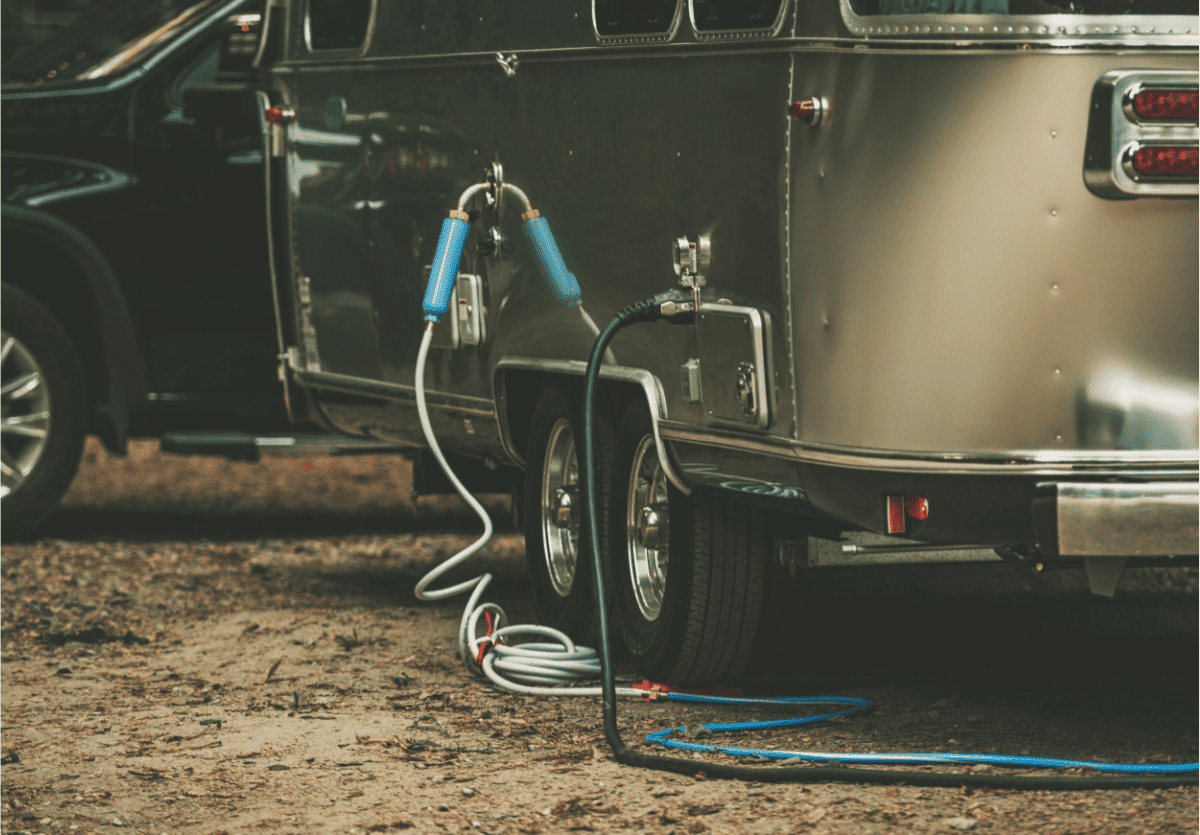
An RV extension cord is a lot like an extension cord at home. You plug your RV power cord into one end and then plug the other end of the extension cord into the shore power pedestal.
Extension cords for RV are handy because sometimes, you might find yourself parked a little too far away from the nearest power pedal. If your power cord doesn’t reach, and you don’t have an extension, you’ll either have to find a new spot or go without power.
By keeping an extension cord handy (or even a few different ones), you can avoid this headache, and rest assured you’ll always be able to reach the power pedestal.
Can You Use a Normal Household Extension Cord as an RV Extension Cord?
So if an RV extension cord and a regular cord both do the same job, does that mean you can use a normal household extension cord for your RV?
The short answer is no! If you want to extend your RV power cord, you’ll need to use a special extension cord made for RVs for 2 reasons:
- A normal household extension cord simply isn’t designed for the task of supplying power to your RV. RV extension cords need to be designed to withstand the elements and handle the large amount of power your RV requires.
- If you try to plug your RV power cord into a household extension cord, you’ll find it simply won’t fit. This is because RV power cords use different types of plugs than household power cords.
What To Consider When Buying RV Extension Cords
There are a few things to consider when buying an RV extension cord. Let’s take a look at each.
Length
You’ll find extension cords for RVs in various lengths, ranging from 15 feet to 50 feet (or more).
Generally speaking, you should use the shortest extension cord that suits your needs. Longer extension cords lose more power over their length. If you use a cord that’s longer than you need, you’re also wasting power unnecessarily.
30-Amp vs 50-Amp
Your RV will have either a 30-amp electrical system or a 50-amp system. Generally speaking, 30-amp systems are for smaller RVs, while larger RVs (like fifth wheels) will have 50-amp systems.
Your RV extension cord will need to match your RV’s electrical system. To know what your RV has, you can check your electrical service panel. You can also simply check the plug and see how many prongs there are.
- 3 prongs? It’s a 30-amp cord and system.
- 4 prongs? It’s a 50-amp cord and system.
Consider Getting an Adapter Too
In some cases, you may find yourself at a campground that only has 30-amp connections on its power pedestals. Or in even rarer cases, only a 50-amp hookup. So what do you do if the amperage available doesn’t match your RV?
Thankfully, you can use an RV power cord adapter to solve this issue. Using a 30-amp to 50-amp adapter, you can safely plug into the 50-amp receptacle.
Adapters also exist to plug a 50-amp cord into a 30-amp receptacle. Keep in mind that this will leave your RV with less power than normal, so won’t be able to use power-hungry devices like air conditioners.
Top 3 Best RV Extension Cords
Now that we know all about RV extension cords, let’s look at the best ones you can buy right now.
1. Camco 25 Ft. 30-Amp RV Extension Cord
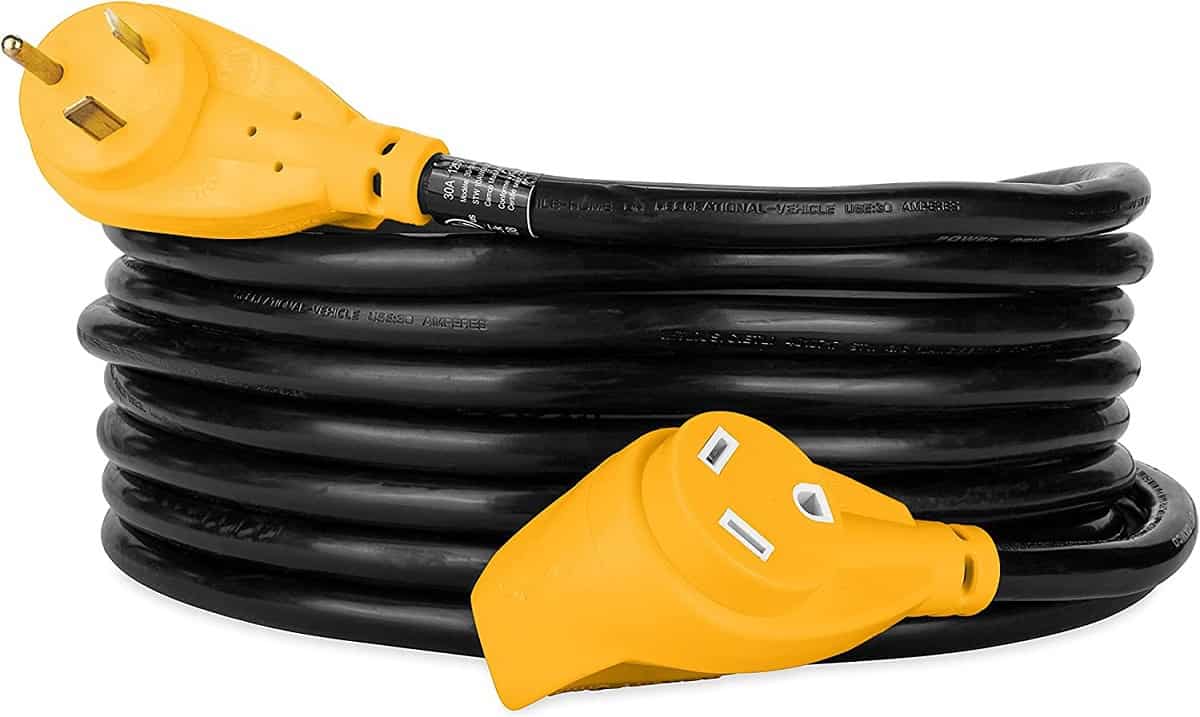
There’s a good chance you’re already familiar with Camco as a trusted source of affordable, quality RV products, and this extension cord is no different. This 30-amp extension cord for RVs features a 10 gauge wire and thick, heavy-duty PVC coating to withstand the wear and tear of outdoor use.
This RV extension cord also has 90-degree plugs and ergonomic grips for easier plugging and unplugging. If you need extra length, it also comes in a 50-foot version.
2. RVMATE 25 Ft. 50-Amp RV Extension Cord
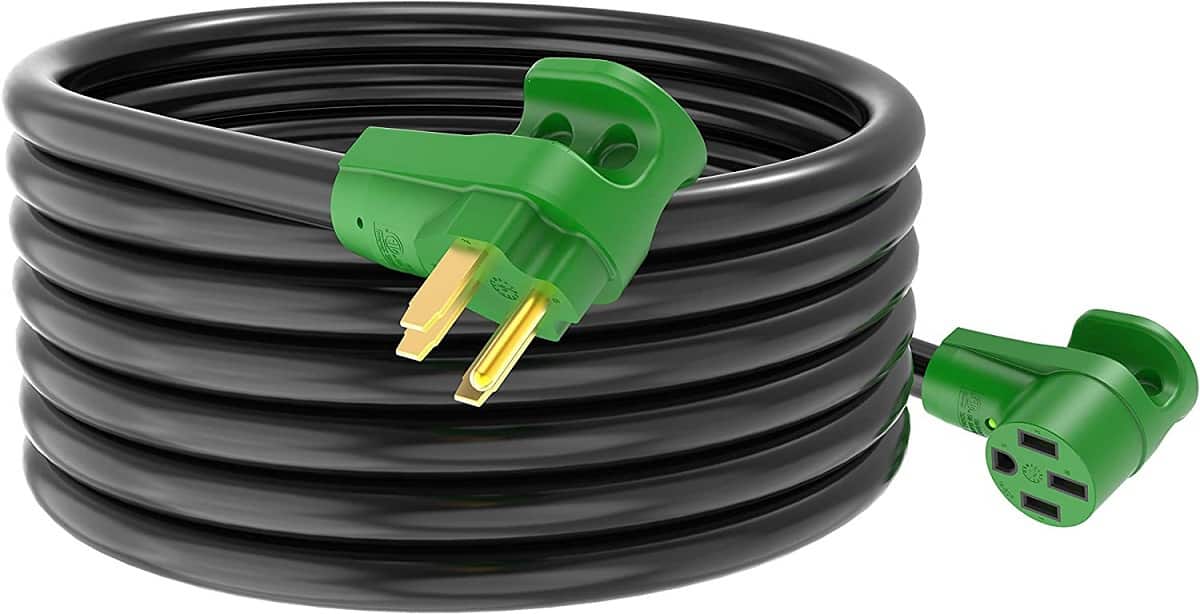
If you need a powerful 50-amp extension cord for your RV, this cord from RVMATE has you covered. This cable uses thick 6 gauge and 8 gauge wire to better handle powerful currents, and it’s waterproof and UV-resistant for better protection from the elements.
The plugs feature ergonomic grips to make plugging in easier. An LED indicator light shows when the cord has power. As an added bonus, this RV extension cord includes a plastic strap and a bag for storage, plus a cleaning towel.
3. Conntek 30 Ft. 50-Amp RV Extension Cord
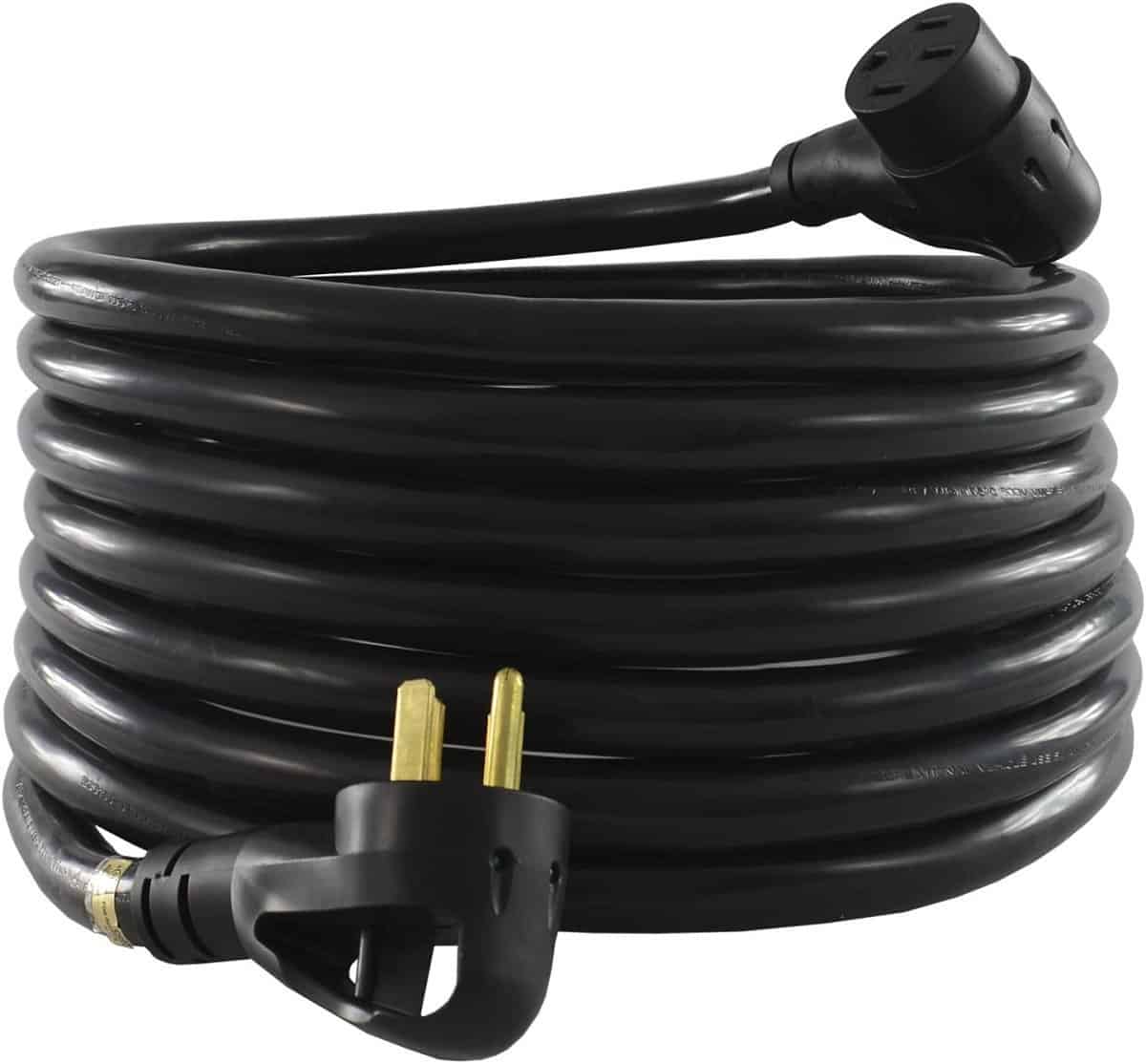
If you’re just looking for a basic, no-frills extension cord, look no further than this 30-foot cord 50 amp RV extension cord from Conntek. This simple extension cable has 90-degree plugs with ergonomic handles and LED power indicator lights at both ends. It’s also available in a 50-foot version if you need extra length.
RV Extension Cords Are a Must for Any RVer
RV extension cords let you extend your power cord so that you can always be sure you can plug in and power your RV. When you’re deciding on which to buy, be sure that your extension cord matches your power cord. A 30-amp system needs a 30-amp extension cord, and a 50-amp system needs a 50-amp cord.
With an extension cord in your RV, you’ll never have to worry about getting stuck without power again!

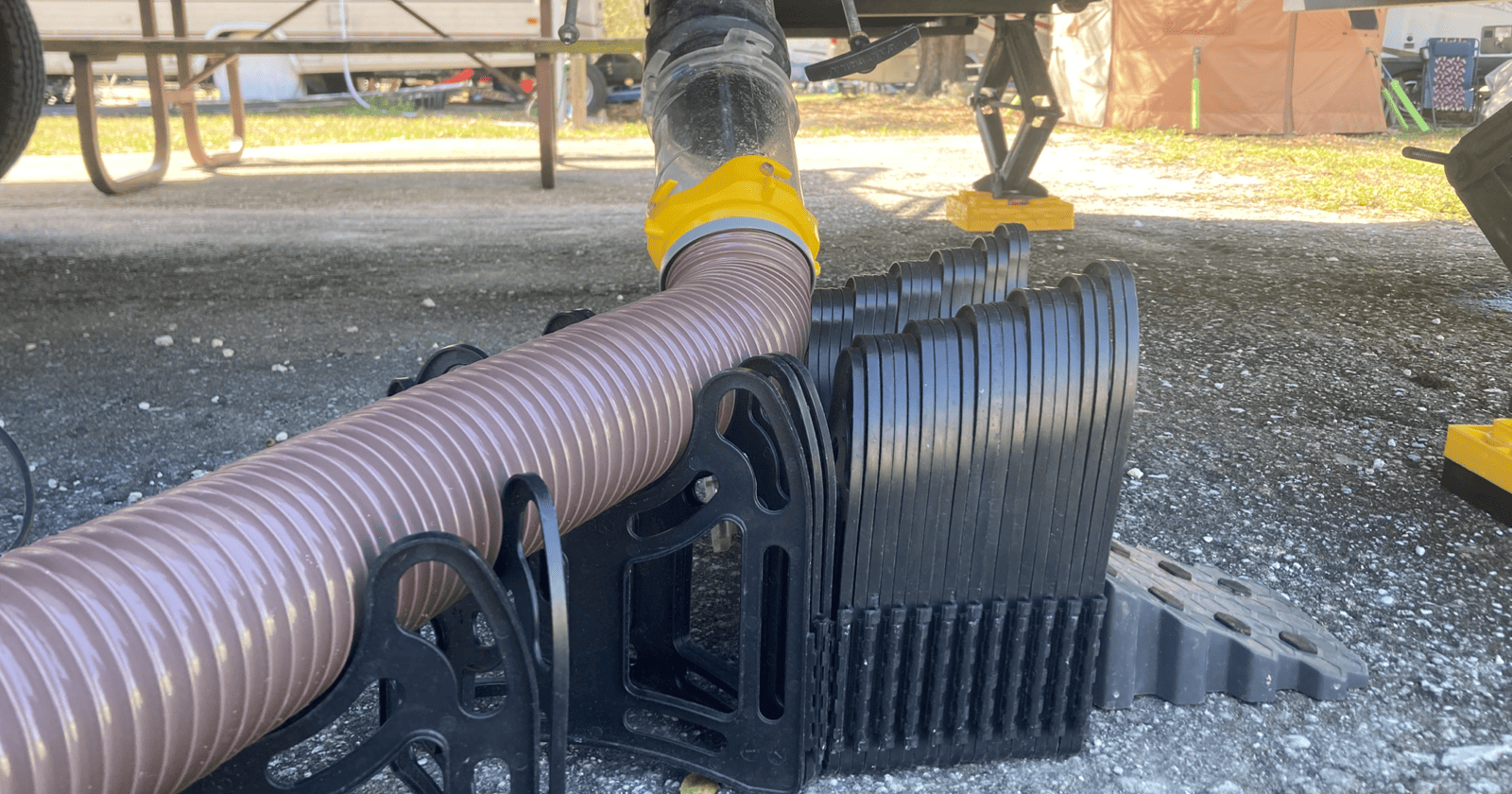

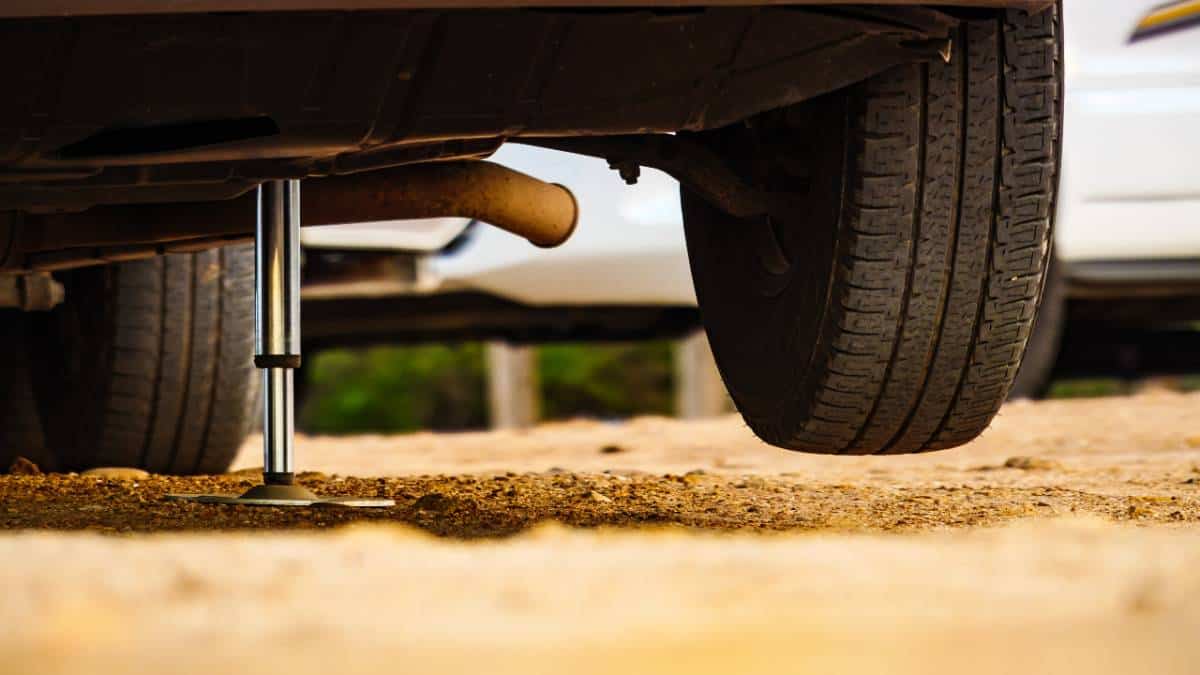

Unless I missed it you should also speak to gauge of the extension
Can you plug into a 20amp with a 30amp plug safely?
Yes, as long as you are careful not to use over 20 amps in your rig. A good rule of thumb is to only run one high-powered device at a time, but a way to monitor your amp draw is preferable. A good power monitoring/surge protector can help. The SoftStartUP can help you run an AC on a 30 amp, and has a power monitoring app that connect through Bluetooth.
Many rely on the 20 amp breaker to tell them their limit, but breakers don’t always trip before plugs start to melt from the heat.
Thanks for being a Cmaper Smarts reader.
Your reply/comments are exactly what we have taken in consideration. We only use this set-up pre-trip and in our driveway; otherwise,we have a dock with 30amp service. We use a 10ga extension cord, as opposed to a 12/2ga cord with the 30amp dogbone. Again, we have not had any issues with this set-up when connecting to a 20amp outlet in our S&B garage.
Thanks.
I have heard that the little plug type adapters are inferior to the cord type adapters. Is this true?
Is there some sort of device to cover the connection from the RV cord to the extension cord to protect from water when it rains? Mine is exposed and I figure that can’t be good. I’ve looked on Amazon and the only thing I found are protectors for household ext cords.
They are generally not an issue in normal rain circumstances as long as they’re not sitting in a puddle. Some RVers place the connection up on leveling blocks to keep it off the ground. However, the safest method would be a cover. Amazon does sell them here: GR Innovations LLC RV Extension Cord Cover | Plug Saver | Trailer RV Camper
Thanks for reading.
Also, consider the distance you need to run your extension cord. In my experience, running a high load on a 75′ extension (1×25′ + 1×50′) is not a good idea on a smaller gauge wire. Not sure what’s needed to calculate what is safe, but IMHO running that length the incorrect gauge will cause damage to the wire or connectors. Maybe someone here can explain?